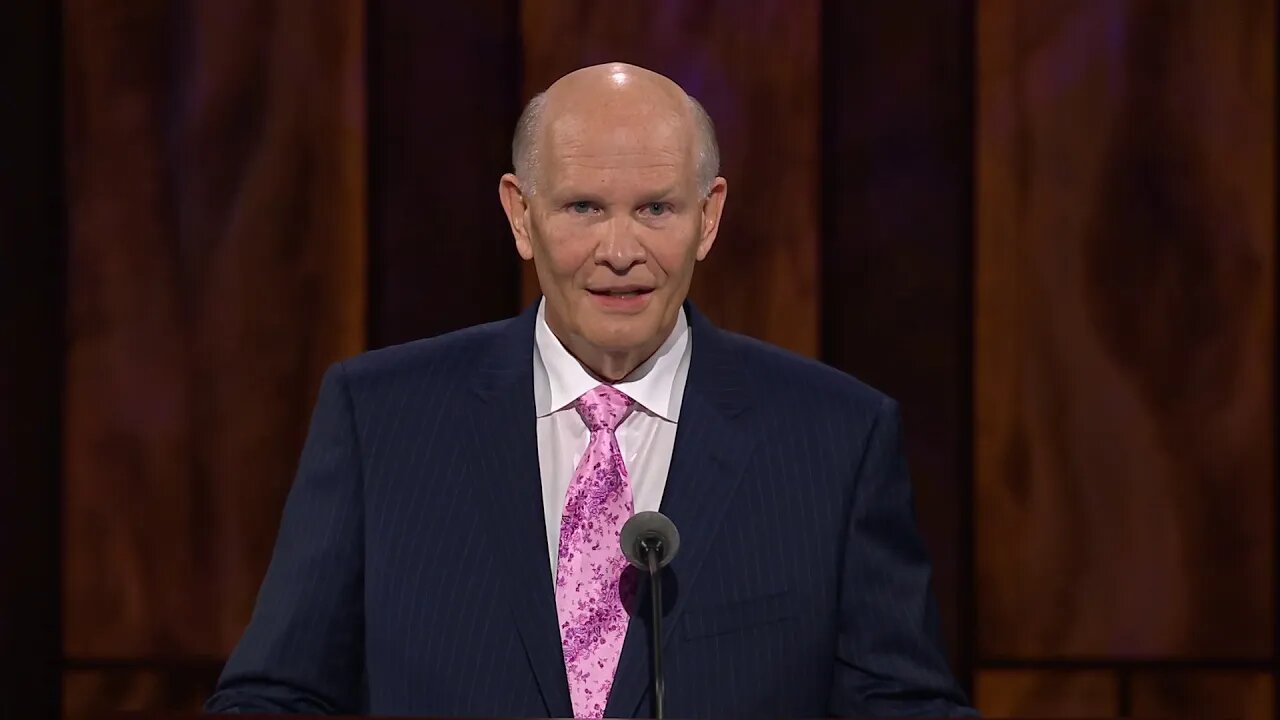Premium Only Content

Dale G. Renlund | Do Justly, Love Mercy, and Walk Humbly with God |Oct 2020 Conference |Faith To Act
Do Justly, Love Mercy, and Walk Humbly with God
By Elder Dale G. Renlund
Of the Quorum of the Twelve Apostles
To do justly means acting honorably. We act honorably with God by walking humbly with Him. We act honorably with others by loving mercy.
As followers of Jesus Christ, and as Latter-day Saints, we strive—and are encouraged to strive—to do better and be better.1 Perhaps you have wondered, as I have, “Am I doing enough?” “What else should I be doing?” or “How can I, as a flawed person, qualify to ‘dwell with God in a state of never-ending happiness’?”2
The Old Testament prophet Micah asked the question this way: “Wherewith shall I come before the Lord, and bow myself before the high God?”3 Micah satirically wondered whether even exorbitant offerings might be enough to compensate for sin, saying: “Will the Lord be pleased with thousands of rams, or with ten [thousand] … rivers of oil? shall I give my firstborn for … the sin of my soul?”4
The answer is no. Good deeds are not sufficient. Salvation is not earned.5 Not even the vast sacrifices Micah knew were impossible can redeem the smallest sin. Left to our own devices, the prospect of returning to live in God’s presence is hopeless.6
Without the blessings that come from Heavenly Father and Jesus Christ, we can never do enough or be enough by ourselves. The good news, though, is that because of and through Jesus Christ we can become enough.7 All people will be saved from physical death by the grace of God, through the death and Resurrection of Jesus Christ.8 And if we turn our hearts to God, salvation from spiritual death is available to all “through the Atonement of [Jesus] Christ … by obedience to the laws and ordinances of the Gospel.”9 We can be redeemed from sin to stand clean and pure before God. As Micah explained, “[God] hath shewed thee, O man, what is good; and what doth the Lord require of thee, but to do justly, and to love mercy, and to walk humbly with thy God?”10
Micah’s direction on turning our hearts to God and qualifying for salvation contains three interconnected elements. To do justly means acting honorably with God and with other people. We act honorably with God by walking humbly with Him. We act honorably with others by loving mercy. To do justly is therefore a practical application of the first and second great commandments, to “love the Lord thy God with all thy heart, and with all thy soul, and with all thy mind … [and to] love thy neighbour as thyself.”11
To do justly and walk humbly with God is to intentionally withdraw our hand from iniquity, walk in His statutes, and remain authentically faithful.12 A just person turns away from sin and toward God, makes covenants with Him, and keeps those covenants. A just person chooses to obey the commandments of God, repents when falling short, and keeps on trying.
When the resurrected Christ visited the Nephites, He explained that the law of Moses had been replaced by a higher law. He instructed them not to “offer up … sacrifices and … burnt offerings” any longer but to offer “a broken heart and a contrite spirit.” He also promised, “And whoso cometh unto me with a broken heart and a contrite spirit, him will I baptize with fire and with the Holy Ghost.”13 When we receive and use the gift of the Holy Ghost after baptism, we can enjoy the constant companionship of the Holy Ghost and be taught all things that we should do,14 including how to walk humbly with God.
Jesus Christ’s sacrifice for sin and salvation from spiritual death are available to all who have such a broken heart and contrite spirit.15 A broken heart and contrite spirit prompt us to joyfully repent and try to become more like our Heavenly Father and Jesus Christ. As we do so, we receive the Savior’s cleansing, healing, and strengthening power. We not only do justly and walk humbly with God; we also learn to love mercy the way that Heavenly Father and Jesus Christ do.
God delights in mercy and does not begrudge its use. In Micah’s words to Jehovah, “Who is a God like unto thee, that pardoneth iniquity, … will have compassion upon us,” and will “cast all … sins into the depths of the sea.”16 To love mercy as God does is inseparably connected to dealing justly with others and not mistreating them.
The Book of Mormon - Another Testament of Jesus Christ
Get your FREE copy 👉http://bit.ly/MyBookofMormon 🙏
Get your FREE copy of The New Proclamation to the World: “The Restoration of the Fulness of the Gospel of Jesus Christ”
🙏🏼http://bit.ly/Restoration200
😇Come Unto Christ - Faith to Act - http://www.faithtoact.com
#GeneralConferenceOct2020 #FaithToAct #Christian
#BookofMormon #ComeUntoChrist #HeLives #HearHim #TheRestoration
-
 21:26
21:26
Stephen Gardner
18 hours ago🔥What JUST leaked out of Congress must be STOPPED NOW!
17.9K55 -
 53:25
53:25
tether
11 days agoStability and Freedom in Chaos: The Story of Tether USD₮ | Tether Documentary (USDT)
32.6K4 -
 56:44
56:44
VSiNLive
1 day agoFollow the Money with Mitch Moss & Pauly Howard | Hour 1
672 -
 36:50
36:50
Anthony Pompliano
2 days ago $0.06 earnedInvestors Are ALL-IN On Bitcoin
3254 -
 32:19
32:19
SB Mowing
9 days agoA Backyard She’s NEVER Seen – Now Safe for the Kids to Play!
8.15K12 -
![[Day 26] CS Blast bounty baby](https://1a-1791.com/video/fwe2/8a/s8/1/Z/H/j/_/ZHj_w.0kob-small-Day-26-CS-Blast-bounty-baby.jpg) 2:09:11
2:09:11
ggezlol_tv
3 hours ago[Day 26] CS Blast bounty baby
19.4K -
 2:32:17
2:32:17
Sgtfinesse
2 hours ago💥Sunday Morning Hunt for Featherweight Artifact | New World PVP Server: Sclavia
11.8K1 -
 11:25
11:25
Film Threat
19 hours agoLET'S DISCUSS THE 2025 OSCAR NOMINATIONS | Film Threat News
13K6 -
 13:07
13:07
DEADBUGsays
3 hours agoThe Southport Massacre, The Great British Cover-Up
22.5K12 -
 25:26
25:26
hickok45
6 hours agoSunday Shoot-a-Round # 265
13K25